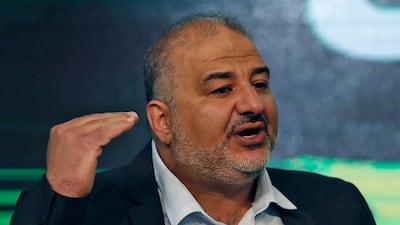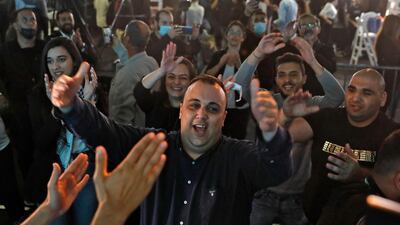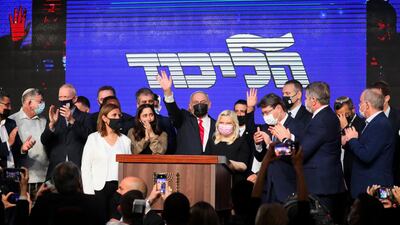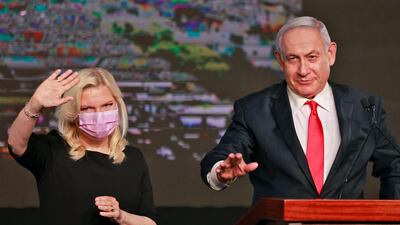Israel was gripped once more by political deadlock on Wednesday as the latest election results showed Prime Minister Benjamin Netanyahu’s right-wing bloc falling short of a majority, raising the prospect of weeks of uncertainty and a possible fifth contest.
Although exit polls put Mr Netanyahu and his allies within reach of a 61-seat parliamentary majority on Tuesday night, the fortunes of Israel’s longest-serving leader waned as the ballots were counted.
With most votes counted, the prime minister's Likud is set to emerge as the largest party with 30 seats. But even with the support of various right-wing and religious alliances, he currently stands two seats short of a governing coalition.
“The outcome is a very, very close call,” said Yohanan Plesner, president of the Israel Democracy Institute.
“It’s proved yet again that Israelis are split right down the middle when it comes to the question which defines Israeli politics today: for or against the continuation of the premiership of Benjamin Netanyahu,” he said.
Anti-Netanyahu legislators failed to unite around one candidate, and represent a plethora of political views. The bloc includes the leftist parties Labor and Meretz, the centrist Blue and White alliance, the Arab-led Joint List, and New Hope, which was founded by Likud defector Gideon Sa’ar.
The closest challenger to Mr Netanyahu is Yair Lapid of the Yesh Atid party, which picked up 18 seats according to the latest results.
“Two years of paralysis and very little effect on actual voting patterns,” said Mr Plesner, as Israelis face their fourth inconclusive election result since April 2019.
Mr Netanyahu had anticipated a spike in the polls owing to the country’s speedy vaccination drive, with the government broadly reopening the economy earlier this month as the coronavirus infection rate dropped.
"I think Israel serves as a model for the world," the prime minister said earlier this month.
More than 55 per cent of Israelis have received their first dose, though the government has faced criticism from rights groups for providing vaccines for only about two per cent of the Palestinian population in Gaza and the West Bank.
Having failed to win over enough voters to give him and his allies a coalition, Mr Netanyahu must now convince other legislators to back him for the leadership.
An unlikely kingmaker has emerged in Mansour Abbas, whose Ra’am party made a dramatic comeback to pick up five seats after exit polls forecast it would fail to make it into parliament.
Ra'am split with the Joint List, which looks likely to win six seats, after Mr Abbas controversially suggested he was open to working with Mr Netanyahu to get Arab affairs on the government agenda.
The conservative politician could now give his backing to either the pro- or anti-Netanyahu bloc, though Arab parties have never served in government.
“Likud is very divided within itself about whether they want to work with him in building a coalition or supporting a coalition from the outside,” said Dahlia Scheindlin, a pollster and political analyst.
Another key player who has yet to publicly pick sides is Naftali Bennett, leader of the right-wing Yamina party, which is on track to win seven seats.
“So far Bennett can’t help Netanyahu, because even with him he only has 59,” Dr Scheindlin said.
“He could defect to the other side, to the non-Netanyahu parties, but I have a hard time seeing how they would get to 61,” she added, because the chance of Mr Bennett working with the Joint List remains remote.
With no clear path to victory for either bloc, over the coming days politicians will be trying to woo potential defectors to help their side gain a majority.
After the final results are presented next week to President Reuven Rivlin, he will consult with party chiefs before choosing a leader to form a government. Negotiations could take weeks and if no politician is able to build a coalition, Israelis will vote for a fifth time later this year.
Voting in Jerusalem on Tuesday, Mr Rivlin said the deadlock has taken its toll.
“Four elections in two years erode public trust in the democratic process,” he said, even as he urged Israelis to vote again. “There is no other way.”
While Mr Netanyahu has tough talks ahead of him, the president of the Israel Democracy Institute said there is still some likelihood he will reach 61 seats.
Such a coalition would include Religious Zionism, a far-right alliance that exceeded expectations and is set to clinch six seats. Led by Bezalel Smotrich, their ticket includes lawyer Itamar Ben-Gvir who is widely seen as a disciple of the late racist ultranationalist Meir Kahane.
“Many of them had no voice in parliament, rather only in street protests, and they represent some of the most radical if not extreme and intolerant voices in Israeli society,” Mr Plesner said.
If such a government emerges, he suggested it would be marked by unconventional policymaking which would affect the judiciary and law enforcement.
“It would be a rollercoaster or, some would say, a ‘fasten your seat belts’ scenario,” he said.






























